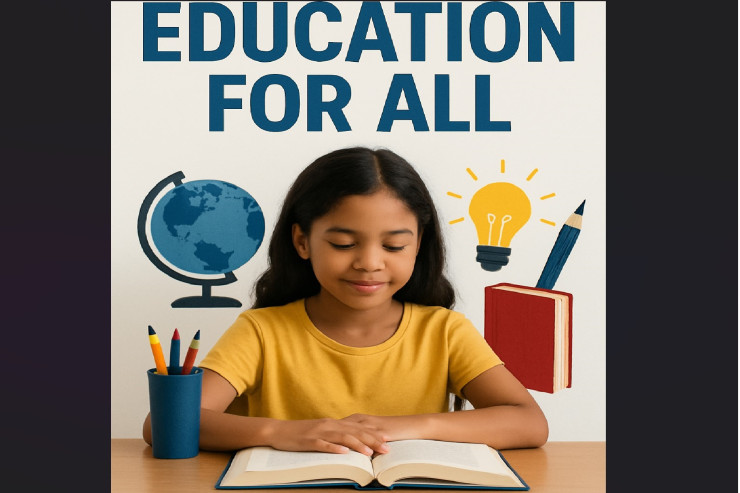- Description
- FAQ
- Updates
- Comments
Education is the foundation of a brighter future, yet millions of children across India are denied access to quality education due to poverty and lack of resources. At Rohi Foundation, we are dedicated to breaking down the barriers to education and ensuring that every child has the opportunity to learn, grow, and succeed.
Through this campaign, we aim to provide educational support to underprivileged children by offering scholarships, school supplies, and access to quality learning environments. With your support, we can give these children a chance to build a better future for themselves and their communities.
Your donation will directly impact the lives of these children by funding school fees, books, uniforms, and other essentials they need to succeed. Education not only opens doors to better job opportunities but also helps break the cycle of poverty for future generations.
When we address critical issues such as healthcare, poverty, population control, unemployment, and human rights, there exists no more effective starting point than granting education to underprivileged children. Education not only bestows upon children the tools for a secure future but also nurtures their development into conscientious citizens with a national and global perspective. The enactment of the Right to Education (RTE) Act in 2010 marked a significant step, ensuring free and obligatory education for children aged 6 to 14. Yet, even after a decade, numerous children face an uneven educational journey. Hindrances like the socio-economic status of parents and inadequate learning environments in schools impede many from accessing education.
What is the role of NGO in education?
Non-Governmental Organizations (NGOs) play a crucial role in improving and advancing education, especially in underserved and marginalized communities. Their roles include:
- Advocacy and Awareness: NGOs raise awareness about the importance of education and advocate for policies that support equitable and quality education for all.
- Access to Education: NGOs work to ensure that education is accessible to all, particularly those facing barriers like poverty, gender discrimination, disabilities, or remote locations.
- Resource Provision: NGOs provide essential resources such as textbooks, school supplies, uniforms, and technology to students and schools that lack adequate funding.
- Teacher Training and Development: NGOs offer training and professional development programs for teachers to enhance their skills, teaching methods, and pedagogical approaches.
- Curriculum Development: NGOs collaborate with education experts to develop relevant, inclusive, and engaging curricula that align with modern needs and global standards.
- Infrastructure Improvement: NGOs help build and renovate schools, classrooms, libraries, and other educational facilities to create conducive learning environments.
- Early Childhood Education: NGOs focus on early childhood education to ensure that children develop foundational skills before entering formal schooling.
- Girls’ Education: NGOs promote gender equality by advocating for and providing opportunities for girls’ education, addressing cultural barriers and encouraging enrollment and retention.
- Skill Development: NGOs offer vocational training and skill-based education to equip students with practical skills relevant to the job market.
- Special Education: NGOs support the education of children with disabilities by providing resources, teacher training, and inclusive classroom practices.
- Community Engagement: NGOs involve parents, community members, and local leaders in education initiatives, fostering a sense of ownership and support.
- Research and Data: NGOs conduct research to understand education challenges, gather data on educational outcomes, and inform evidence-based policy recommendations.
- Emergency Education: In crisis and conflict situations, NGOs provide emergency education services to ensure continuity of learning for affected children.
- Advocacy for Education Rights: NGOs advocate for the right to education as a fundamental human right, ensuring governments and institutions are held accountable.
- Capacity Building: NGOs strengthen local education systems by training teachers, administrators, and community members to better manage and sustain educational initiatives.
- Monitoring and Evaluation: NGOs assess the impact of their programs through monitoring and evaluation, making adjustments based on data to improve effectiveness.
- Policy Influence: NGOs influence education policies at local, national, and international levels by offering insights, research, and practical solutions.
- Collaboration: NGOs often collaborate with governments, other NGOs, schools, businesses, and international organizations to pool resources and expertise.
NGOs contribute to making education accessible, inclusive, and of high quality, thereby supporting individuals’ personal development, community progress, and societal well-being.
What are the effects of lack of education?
- Limited Employment Opportunities: Without a proper education, individuals often lack the necessary skills and qualifications to access higher-paying and more stable job opportunities. This can lead to unemployment or underemployment, contributing to cycles of poverty and financial instability.
- Lower Income Levels: People with lower levels of education tend to earn lower incomes over their lifetimes. This can result in a lower standard of living, inadequate access to basic needs, and limited opportunities for personal and family development.
- Limited Social Mobility: Education is often seen as a means of social mobility, allowing individuals to improve their socioeconomic status. Lack of education can trap individuals and communities in a cycle of poverty, making it difficult for them to break free from their current circumstances.
- Health Issues: Lack of education can lead to limited understanding of health-related information, contributing to poor health outcomes. People with lower education levels may have less access to proper healthcare, be less likely to adopt healthy behaviors, and lack awareness of important health issues.
- Higher Crime Rates: Education plays a role in reducing crime rates by providing individuals with alternatives to criminal activities, helping them develop critical thinking skills, and fostering a sense of community responsibility. Lack of education can contribute to higher crime rates and social instability.
- Reduced Civic Participation: Education is crucial for fostering an informed and engaged citizenry. Individuals with limited education might not fully participate in civic and political processes, leading to reduced civic engagement and potentially limiting the development of democratic societies.
- Increased Gender Inequality: In many parts of the world, lack of education disproportionately affects women and girls, perpetuating gender inequalities. When girls are denied education, it can reinforce gender stereotypes, limit their opportunities, and contribute to the cycle of poverty.
- Limited Innovation and Economic Growth: Education is a driver of innovation and economic growth. A lack of educated individuals means fewer people contributing to scientific research, technological advancements, and creative endeavors that can drive progress in societies.
- Inter-generational Impact: The effects of lack of education can extend to future generations. Children born to parents with limited education are often at a disadvantage in terms of health, education, and opportunities, perpetuating the cycle of poverty.
- Social Instability: Societies with high levels of educational inequality and low overall education levels are more prone to social unrest, political instability, and conflicts. Education can promote understanding, tolerance, and cooperation among different groups within a society.
It’s important to note that the effects of lack of education can vary depending on cultural, economic, and geographical contexts. Addressing educational disparities and ensuring access to quality education for all individuals is crucial for fostering individual development, societal progress, and global stability.
What advantages does education offer?
- Personal Development: Education equips individuals with knowledge, skills, and critical thinking abilities that contribute to their personal growth and self-awareness. It helps individuals develop a deeper understanding of themselves and the world around them.
- Empowerment: Education empowers individuals by providing them with the tools to make informed decisions, solve problems, and navigate various aspects of life. It enables individuals to have more control over their circumstances and make choices that lead to positive outcomes.
- Employment Opportunities: Education enhances employability by equipping individuals with the skills and qualifications needed to access a wide range of job opportunities. Higher levels of education often correlate with higher earning potential and more stable employment.
- Economic Growth: A well-educated workforce contributes to economic growth by driving innovation, productivity, and technological advancements. Educated individuals are more likely to create and contribute to businesses, industries, and sectors that spur economic development.
- Healthier Lifestyles: Education is linked to better health outcomes. Educated individuals tend to adopt healthier lifestyles, make informed healthcare decisions, and have a greater understanding of preventive measures, leading to improved overall health and well-being.
- Social Mobility: Education is a key factor in breaking the cycle of poverty. It provides individuals with opportunities to improve their socioeconomic status and achieve upward social mobility, regardless of their background or circumstances.
- Civic Engagement: Education fosters active citizenship and civic participation. Educated individuals are more likely to engage in political processes, contribute to community development, and advocate for social and environmental issues.
- Reduced Inequality: Education can help reduce societal inequalities by providing marginalized groups with the tools to overcome barriers and access opportunities that were previously denied to them.
- Promotion of Tolerance and Diversity: Education promotes understanding and tolerance among diverse groups of people. It exposes individuals to different cultures, viewpoints, and perspectives, fostering a more inclusive and harmonious society.
- Personal Fulfillment: Education enables individuals to pursue their passions, interests, and talents. It offers opportunities for creative expression and personal fulfillment, contributing to a sense of purpose and happiness.
- Environmental Awareness: Education can raise awareness about environmental issues and sustainable practices. It equips individuals with the knowledge to make environmentally conscious choices and contribute to efforts to address climate change and other ecological challenges.
- Global Development: Education is a critical component of global development. Educated societies are better equipped to address global challenges, such as poverty, disease, and social unrest, through collaborative and informed efforts.
Overall, education plays a pivotal role in shaping individuals’ lives, fostering societal progress, and contributing to the betterment of the world. By investing in education, societies can unlock human potential, promote positive values, and work towards a more equitable and sustainable future.
What steps can we take to enhance the quality of education?
To eradicate disparities, it’s crucial for every citizen within the nation to receive education and enjoy enhanced prospects for a better life. The foremost measure entails augmenting governmental allocation towards education. This initiative would lead to the enhancement of public schools, as the expanded budget could contribute to teacher training, timely provision of books and uniforms, and the upkeep of superior infrastructure within these institutions. This includes facilities like hygienic and operational restrooms, handwashing stations, access to clean water, digital resources, and recreational spaces.
General Question
No Update Found
Login To Leave a Comment
Related Causes


Comments (0)